
Aug 9
1888 Birth: Hans Oster: Chief of Staff to Admiral Canaris at the Abwehr:

Said to have been a staunch anti-Nazi, Oster passed on warnings to the Allies of German plans for aggression against Holland, Belgium and Denmark in 1939-40, but also was instrumental in implementing many of Hitler's pet schemes. Later he will become a central organizer of the German resistance. Dismissed from the Abwehr in April 1943. Arrested following the failed attempt on Hitler's life in July 1944. Executed at Flossenburg concentration camp in April, 1945. (THP)
1902 United Kingdom: Edward VII and Alexandra of Denmark are crowned King and Queen of the United Kingdom of Great Britain and Ireland. [For further information, click here]
1909 Birth: Adam von Trott zu Solz:
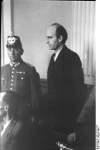
In 1940 von Trott joined the Nazi Party in order to access party information and monitor its planning. At the same time, he served as a foreign policy advisor to the clandestine group of intellectuals planning the overthrow of the Nazi regime known as the Kreisau Circle. Von Trott was part of the unsuccessful plot of July 20 1944 to assassinate Hitler. He was arrested within days, placed on trial, and found guilty. Sentenced to death on 15 August 1944 by the Volksgerichtshof, he was hanged in Berlin's Ploetzensee prison on August 26th.
1914 World War I: Walter Rathenau of AEG takes charge of German war production:
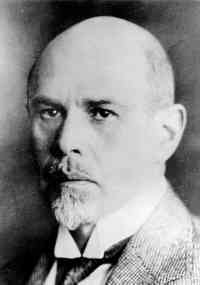
On August 9, 1914, barely one week after the outbreak of the First World War, German Minister of War Erich von Falkenhayn puts Walter Rathenau of the large electronics firm Allgemeine-Elektrizitats-Gellellschaft (AEG) in charge of organizing all the raw materials for Germany’s war production. [For further information, Click here]
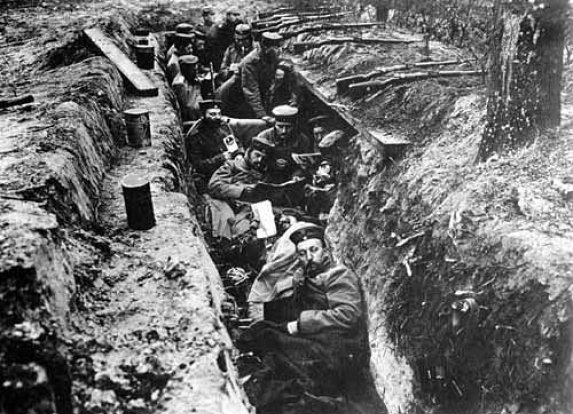
1915 World War I: List Regiment: Gefreiter Adolf Hitler's 16 Reserve Infantry Regiment continue to occupy a position, at Fromelles, on a level field with water channels, willow trees and willow stalks; in the distance, towards the enemy lines, lies an insignificant wood with barbed wire entanglements. Under the direction of their defense-minded commander, Lieutenant General Gustav Scanzoni von Lichtenfels, the regiment works ceaselessly day and night to further fortify their position at Fromelles while fighting off repeated assaults by the enemy. [For further details, Click here.]
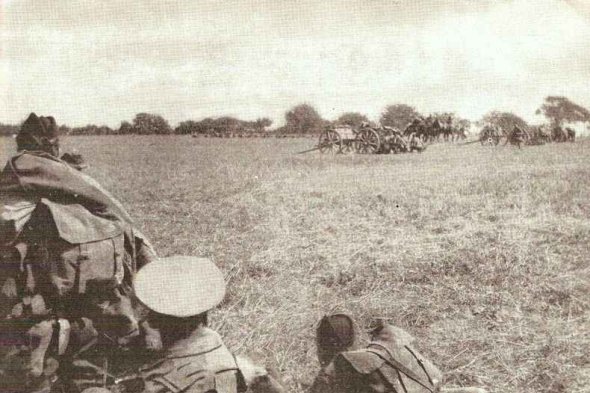
1916 World War I: List Regiment: Gefreiter Adolf Hitler endures trench warfare in Flanders (Artois) with 3 Company, 16 Reserve Infantry Regiment. [For further details, Click here.]
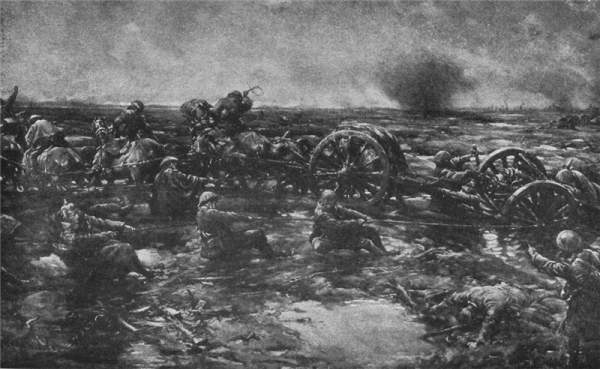
1917 World War I (July 22-September 8): Dispatch Runner Gefreiter Adolf Hitler serves at the front with 3 Company, 16 Bavarian Reserve Infantry Regiment during Phase 2 operations in Flanders. Most of their time in the trenches gas masks are worn, while English bombers fly overhead, and tanks—a new terror witnessed for the very first time by most in this campaign—attempt to advance over a long front through seas of mud. [For further details, Click here.]
1918 World War I: Various:
Second Battle of the Marne:General Degoutte's Address to French and US Troops:
Before the great offensive of July 18th, the American troops, forming part of the Sixth French Army, distinguished themselves by clearing the "Brigade de Marine" Woods and the village of Vaux from the enemy and arresting his offensive on the Marne and at Fossoy. Since then they have taken the most glorious part in the second battle of the Marne, rivalling the French troops in ardour and valour. During twenty days of constant fighting they have freed numerous French villages and made, across a difficult country, an advance of forty kilometres, which has brought them to the Vesle. Their glorious marches are marked by names which will shine in future in the military history of the United States: Torcy, Belleau, Plateau d'Etrepilly, Epieds, Le Charmel, l'Ourcq, Seringes-et-Nesles, Sergy, La Vesle, and Fismes. These young divisions, who saw fire for the first time, have shown themselves worthy of the old war traditions of the regular army. They have had the same burning desire to fight the Boche, the same discipline which sees that the order given by their commander is always executed, whatever the difficulties to be overcome and the sacrifices to be suffered. The magnificent results obtained are due to the energy and the skill of the commanders; to the bravery of the soldiers. I am proud to have commanded such troops.
The beginning of the end:
As the end draws near, the German lines begin to give way as never before. The Germans fight a skillful rear guard action and when conditions favor them they stand and strike back hard. In most cases they can only be dislodged by vicious, close-in fighting. As they withdraw, the Germans do their demolition work well and greatly slow the Allied advance. Although the German line is never broken, the retreats continue. After being pushed back 20 miles from the Marne and Chateau Thierry, Hitler and his Regiment are shifted north between Arras and Bapaume. Meanwhile, the leaders of the wartime strikes in Germany, who were subsequently sent to the front against their will, are now using their organizational abilities to rouse the men in the trenches. The new replacements are especially vulnerable to their rhetoric. Most of the new soldiers, unlike their Allied counterparts, become convinced that their position is hopeless. Disaffection grows in leaps and bounds. Many soldiers refuse to risk their lives for a cause they see as lost and take the position: "Better a coward for three minutes than dead for the rest of your life." Old front line soldiers like Hitler are scorned as fools. Hitler and his old comrades are devastated by the withdrawals. Four months earlier the Germans had been on the threshold of conquering Europe and had marched toward the front lines with the cry, "'Deutschland ueber alles in der Welt,'" (Germany above all in the world). Now they were nearly back where they had started. Hitler believes that the army should fight to the end. He is convinced that the High Command's custom of constructing fortifications and defensive positions in the rear has an unsettling effect on fighting troops who are drawn to them like a magnet. He believes that huge withdrawals demoralize the troops as well as the civilians at home and build up the morale of the enemy. "In 1918," he would later state, "victory was as nearly in our grasp as it was in that of our adversaries. It was a battle of nerves." Hitler also believed that propaganda played a large role in the German failure. While he considered German propaganda "a complete failure," he considered the "propaganda of the British and the Americans . . . superior, highly skilled and truly inspired." It is these lessons learned that will be reflected in the future Fuehrer's wartime strategies, often with mixed results.
List Regiment (July 20-August 4): Gefreiter Adolf Hitler's 16th RIR is tasked with building a new line of defenses on the site of the failed Second Battle of the Marne. [For further details, Click here.]
1928 Weimar: The Nazi party decides against the formation of National Socialist labor unions:
From Mein Kampf:It (the trade union) created the economic weapon which the international world Jew uses for the ruination of the economic basis of free, independent states, for the annihilation of their national industry and of their national commerce, and thereby for the enslavement of free people in the service of the above-the-state-standing, world finance Jewry (ueberstaatlichen Weltfinanz-Judentums).
1935 All The Kings Men: Huey P. Long: —US Senator from Louisiana and Roosevelt's number one rival in the upcoming presidential elections—makes a speech in the Senate, telling his colleagues that the "Black Hand," led by Jews, has ordered his assassination at a meeting in a New Orleans hotel. (THP)
1936 Jesse Owens wins his fourth gold medal at the Berlin Olympics:
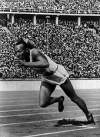
At the 1936 Berlin Olympics, African American track star Jesse Owens wins his fourth gold medal of the Games in the 4x100-meter relay. His relay team set a new world record of 39.8 seconds, which held for 20 years. In their strong showing in track-and-field events at the XIth Olympiad, Jesse Owens and other African American athletes struck a propaganda blow against Nazi leader Adolf Hitler, who planned to use the Berlin Games as a showcase of supposed Aryan superiority.
Born the son of Alabama sharecroppers in 1913, Owens emerged as a major track talent while attending high school in Cleveland, Ohio. Later, at Ohio State University, he demonstrated himself to be one of the greatest athletes in the world. In a single day of competition—May 25, 1935—Owens broke the world records for the 220-yard dash, the 220-yard low hurdles, and the running broad jump, and equaled the world record for the 100-yard dash. The next summer, Owens and 311 other American athletes, including 17 African Americans, traveled to Nazi Germany to represent the United States at the XIth Olympiad.
In 1931, the International Olympic Committee awarded the 1936 Summer Olympics to Berlin. The choice was meant to signal Germany's return to the world community after defeat in World War I. Two years later, however, Adolf Hitler came to power. He transformed the democratic German government into a one-party dictatorship, purged political opponents and suspected dissidents, instituted anti-Semitic policies, and began the remilitarization of Germany.
Hitler initially held the Olympics in low regard because of their internationalism but became an avid supporter after Nazi propaganda minister Joseph Goebbels convinced him of their propaganda value. Seen as an opportunity to advance Nazi ideology, Hitler provided extensive funding for the Berlin Games, which promised to be the largest modern Olympics to date. The Nazi government used sport as part of its drive to strengthen the "Aryan race," and "Non-Aryans"—Jewish, part-Jewish, or Gypsy athletes—were systematically excluded from Nazi-sponsored sports facilities and associations.
By 1935, a number of athletic groups in the United States were pushing for a boycott of the Berlin Games, but after a heated debate U.S. participation was narrowly approved in December 1935. A number of prominent Jewish athletes in the United States and other countries decided to independently boycott the Games in protest of Nazi oppression of Jews. Spain also planned an alternate "People's Olympics" to be held in Barcelona in July 1936, but the outbreak of the Spanish Civil War forced its cancellation. In the end, 49 nations sent some 4,000 athletes to the Summer Olympics in Berlin.
Under international pressure, the Nazis agreed to allow one part-Jewish athlete on its Olympic team: fencer Helene Mayer. However, Joseph Goebbels forbid the Nazi-controlled German press from discussing the ethnicity of the blond-haired Mayer.
On August 1, 1936, Adolf Hitler opened the XIth Olympiad. The Olympic ritual of a runner arriving bearing a torch carried by relay from Olympia, Greece, occurred for the first time. The Nazis advertised this ceremony as a symbol of the myth that German civilization was the inheritor of the glorified culture of ancient Greece.
Olympic flags and swastika-bearing Nazi banners hung everywhere in Berlin. To prevent controversy, the anti-Jewish signs hung throughout the city were removed during the Games, and Jewish athletes and visitors from other countries were not subjected to anti-Jewish laws. Gypsies were cleared off the streets and interned in a camp at the edge of Berlin. A festive and hospitable atmosphere pervaded the German capital, and most tourists left the city with positive memories of their stay there.
With 348 athletes, Germany had the largest national team and captured the most medals overall, greatly pleasing Hitler. The Americans, however, dominated the popular track-and-field events. On the first day of competition, Hitler, who had been congratulating German and select other winners, left the stadium shortly after three African Americans swept the high-jump event. Whether Hitler left to avoid shaking hands with non-Aryans is unclear. In the aftermath of the incident, Olympic organizers asked Hitler to either receive all the medal winners or none, and he chose the latter. Contrary to the popular myth, Hitler never directly snubbed Jesse Owens, but he did continue to privately receive German winners throughout the Games.
With his four gold medals, Jesse Owens was the star of the Berlin Olympics. He equaled the world record (10.3 seconds) in the 100-meter race and broke the world records in the 200-meter race (20.7 seconds) and in the broad jump (26 feet 5 3/8 inches). He was enthusiastically applauded by the largely German crowd and developed a friendship with German long jumper and silver medalist Luz Long. However, he and other African American Olympians were demeaned by a Nazi newspaper that wrote of them as the "black auxiliaries" of the American team.
On August 9, Owens won his fourth medal as a member of the mixed-race 4x100-meter relay team. The world-record-breaking triumph was tainted by the revelation that U.S. coaches had benched two American Jewish relay runners the day before the event. Marty Glickman and Sam Stoller were replaced with Owens and African American Ralph Metcalfe, the two best U.S. sprinters. However, both Stoller and Glickman had out-run Foy Draper, a white American who remained on the team, in a practice race. The coaches said Draper was more experienced, but Glickman and others thought that anti-Semitism was involved. Stoller, however, thought favoritism was to blame, as Draper and the fourth runner, Frank Wykoff, had trained under one of the Olympic coaches at the University of Southern California.
Despite the embarrassment of seeing his best Aryan runners bested by African Americans, Adolf Hitler hailed the Berlin Olympics as a great success. He commissioned a German architect to design a colossal, 400,000-seat stadium at Nuremberg that would host Olympics for "all time to come." The outbreak of World War II in 1939 prevented the building of the stadium, and by 1945 Hitler's plans for Nazi world domination had ended in absolute defeat. In the decades of Cold War that followed, the United States and the Soviet Union exploited the propaganda potential of the Olympic Games as freely as the Nazis did at Berlin in 1936.
Although only 23, Jesse Owens retired from amateur competition shortly after the Berlin Olympics in order to capitalize on his fame. This effectively brought his athletic career to an end. He later engaged in boys'-guidance activities, made goodwill visits to Asia for the U.S. Department of State, and served as secretary of the Illinois State Athletic Commission. He died in 1980. (History.com)
[See: History of Olympic Boycotts: From Berlin to Beijing.]1939 Various:
Danzig:
Germany issues an official warning to the Polish government in Warsaw, saying that another commentary note to Danzig will result in strained Polish-German relations, with Poland being responsible.
The joint British-French military mission finally arrives in Leningrad:
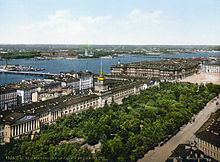
The Soviet Union had invited the British and French to come to Moscow prior to any agreement with the Nazi government so as to first discuss the possibility of a non-aggression pact with them. However, what subsequently became scandalous was that the British military mission, instead of taking a plane (the usual form of transportation for urgent diplomatic missions), decided to literally take a slow boat across the North Sea to the USSR. When they finally arrived, among the matters discussed were the Baltic states, which at that time were bourgeois republics on the borders of the Soviet Union. The Soviet Union had demanded from the British and the French a guarantee against German aggression in the Baltic areas. "Britain," said the same Times dispatch, "was prepared to back Soviet armed entry into the Baltic states if there were `indirect aggression' [from Nazi Germany]." The British defined "indirect aggression" as "that made under threat of force." This definition was not acceptable to the Soviet government.
Zionism: Jews from several Hagana units sink the British police boat Sinbad II in Palestine. (THP)

1940 Rocketry: Robert Goddard launches his last test vehicle, a rocket that forces fuel into the engine by utilizing turbo-pumps. (Gruntman, Burrows)
[See: Wunderwaffen: Hitler's Deception and the History of Rocketry.]1941 World War II: Various:
The Atlantic Conference (Aug 9-12):
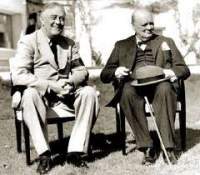
Roosevelt and Churchill hold a conference on a warship off the coast of Newfoundland. The two leaders agree to present plans for a "new world order" based on an end to tyranny and territorial aggrandizement, the disarmament of aggressors, and the fullest cooperation of all nations for the social and economic welfare of all. The result is the so-called The Atlantic Charter, designed as a counterthrust to a possible new Hitler peace offensive as well as a statement of postwar aims. Although the United States has not yet entered World War II, this statement becomes an unofficial manifesto of American and British aims in war and peace. In conclusion, both agree to send strong warnings to Japan in regard to any possible attacks against British or Dutch possessions in the Far East.
Polish Carpathian Brigade defends western section of Tobruk (Aug 9-12): German propaganda gave the besiegers the mocking name of "Rats of Tobruk" but Polish, Australian and British soldiers accepted that name as a honourable one. They claimed that they had not been captured by the "Fox of the Desert" (General Rommel).
1942 World War II: Various:
Death: Edith Stein: a Jewish-born philosopher, Carmelite nun, martyr, and saint of the Catholic Church, who died at Auschwitz.
FDR to Stalin:
Your frank opinion on the following plan, which I think may be useful, would be very much appreciated: For the primary purpose of explaining to the Governments of Iran, Iraq, Turkey, Syria, Saudi Arabia, and Egypt the danger they run in a German victory and that their greatest hope for the future lies in the defeat of Nazi domination of the places of the Near East and the Middle East, I am sending Mr. Wendell Willkie to visit the Governments of these countries. For a wholly different purpose Mr. Willkie would very much like to visit the Soviet Union. In addition to seeing for himself the undying unity of thought in repelling the invader and the great sacrifices which you are all making, he wants to know more about the wonderful progress made by the Russian people. As you know Mr. Willkie was my opponent in the 1940 elections and he is today the head of the minority party. H is heart and soul with my administration in our foreign policy of opposition to Nazism and real friendship with your Government, and he is greatly helping in war work. For the sake of the present and the future I personally think that a visit to the Soviet Union by Mr. Willkie would be a good thing.
The Germans capture the Caucasian oilfields:
Several oil firms such as "German Oil on Caucasus", "Ost-Oel," and "Karpaten-Oel" had been established in Germany. They gained the sole right from the state for exploitation of the Caucasian oil fields within 99 years. For these purposes a large number of pipes, which later proved useful to the Soviet oil industry workers, had been delivered. A special economic inspection "A", headed by Lieutenant-General Nidenfuhr was created. The bombing of oil fields was strongly banned. In order to defend them from destruction by Nikolai Baibakov and Semyon Budennyi an SS guard regiment and a Cossack regiment were formed.
1943 World War II: National Armed Forces (NSZ): a Polish group fighting both Nazis and Communists, kills 26 Polish partisans from the People's Guard aligned with the Soviets.
In 1943 it became clear that Germany was incapable of overcoming the enormous area of the Soviet Union and defeating the Soviet armed forces. The Soviets switched to the offensive on all fronts. It was to be expected that the Germans would retreat under the pressure of the Soviet armies advancing westward across the territory of the Polish republic. It was necessary to decide how the country should behave. Regarding the Germans it was clear - Poland was at war with them and would continue the fight to the end. Russia was also at war with Germany, but entering the territory of Poland would become a danger to Poland's independence. With each victory Russia increased its influence on the decisions of the Allies. Instead of an independent republic they wanted a Polish subservient state organized by them. Poland's situation became tragic.
1944 World War II: Various:
France: The XV Corps, on the left flank of the Third Army, pushes east to capture Le Mans, then north toward Argentan.
The world wars, of 1914-18 & 1939-45, spared the city of Le Mans, which suffered little destruction. Liberated from German occupation on 8 August 1944, the inhabitants of Le Mans, at the end of the 2nd World War, numbered 100000. So Le Mans took its place alongside France's largest cities and now has a population of 150 000 inhabitants.
The Warsaw Uprising: First broadcast by Polish radio in five years.
USA: The US Forest Service and Wartime Advertising Council creates "Smokey Bear."
1945 World War II: Various:
Wunderwaffen: Reconstruction of a captured V-2 with the help of 150 German specialists begins as a group of 284 Russian scientists arrive in Berlin. (Menaul)
Atomic bomb dropped on Nagasaki:
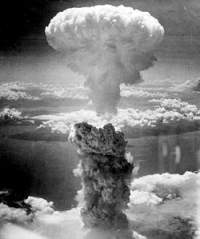
On this day in 1945, a second atom bomb is dropped on Japan by the United States, at Nagasaki, resulting finally in Japan's unconditional surrender.
The devastation wrought at Hiroshima was not sufficient to convince the Japanese War Council to accept the Potsdam Conference's demand for unconditional surrender. The United States had already planned to drop their second atom bomb, nicknamed "Fat Man," on August 11 in the event of such recalcitrance, but bad weather expected for that day pushed the date up to August 9th. So at 1:56 a.m., a specially adapted B-29 bomber, called "Bock's Car," after its usual commander, Frederick Bock, took off from Tinian Island under the command of Maj. Charles W. Sweeney. Nagasaki was a shipbuilding center, the very industry intended for destruction. The bomb was dropped at 11:02 a.m., 1,650 feet above the city. The explosion unleashed the equivalent force of 22,000 tons of TNT. The hills that surrounded the city did a better job of containing the destructive force, but the number killed is estimated at anywhere between 60,000 and 80,000 (exact figures are impossible, the blast having obliterated bodies and disintegrated records).
General Leslie R. Groves, the man responsible for organizing the Manhattan Project, which solved the problem of producing and delivering the nuclear explosion, estimated that another atom bomb would be ready to use against Japan by August 17 or 18—but it was not necessary. Even though the War Council still remained divided ("It is far too early to say that the war is lost," opined the Minister of War), Emperor Hirohito, by request of two War Council members eager to end the war, met with the Council and declared that "continuing the war can only result in the annihilation of the Japanese people..." The Emperor of Japan gave his permission for unconditional surrender. (
Death: Robert Hampton Gray: Canadian naval officer, pilot, and recipient of the Victoria Cross (VC) during World War II, the only member of the Royal Navy's Fleet Air Arm to have been decorated in that war.
Operation August Storm: Japanese defense lines in Manchuria are smashed by Soviet forces numbering almost 1.5 million.
Prior to World War II, Manchuria was colonized by the Japanese and Manchukuo (in pinyin, 'Manzhouguo') was used as a base to invade China, a foolhardy, unnecessary and expensive (in men, materiel and political integrity) move that was as costly to Japan as the invasion of Russia was to Germany, and for the same reasons. After the atomic bombing of Japan in 1945 the Soviet Union invaded from Russian Manchuria as part of its declaration of war against Japan.
1946 Nuremberg Tribunal: On the 199th day of the trial, testimony is taken from Wolfram Sievers, former manager of the Reich Ahnenerbe (Ancestral Heritage Society):
I have personally seen, through the observation window of the chamber, when a prisoner inside would stand a vacuum until his lungs ruptured. Some experiments gave men such pressure in their heads that they would go mad and pull out their hair in an effort to relieve the pressure. They would tear their heads and faces with their fingers and nails in an attempt to maim themselves in their madness. They would beat the walls with their hands and head and scream in an effort to relieve pressure on their eardrums. These cases of extremes of vacuums generally ended in the death of the subject. An extreme experiment was so certain to result in death that in many instances the chamber was used for routine execution purposes rather than as an experiment. I have known Rascher's experiments to subject a prisoner to vacuum conditions or extreme pressure conditions, or combinations of both, for as long as 30 minutes. The experiments were generally classified into two groups, one known as the living experiments, and the other simply as the 'X' experiment, which was a way of saying execution experiment.
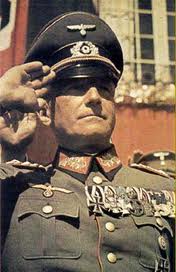
Field Marshal Walter von Brauchitsch testifies for the Defense:
According to the statement made by Hitler in the case of Russia, we were concerned with the fact that if a war were to break out at all, it was to be a preventive war. In the [3 February 1941] conference I limited myself to the purely military misgivings.
General Halder and I reported on three points. One was the size of the Russian area which even today cannot be bridged by motor vehicles alone. The second point was the number of the population, and therewith the large number of picked reserves which were available, and the quite different level of education and enlightenment of the Russian population as compared with the years 1914-1918, matters which I could see for myself when I was a guest of the Red Army in the year 1931. And the third point was the high armament potential of Russia. According to our estimate, Russia at that time had at her command approximately 10,000 tanks.
Hitler must have given some thought to these problems, for he answered immediately and refuted the first two points; namely, by saying that the domination of the Soviets was so much in disfavor among the Russian population, that the system would collapse. Everything would depend only on the decisiveness of the first successes. As far as the third point was concerned, the point of armament, he mentioned, on the bases of detailed figures that he had, as always, at his finger tips, that the armament of Russia could not be at the level which we imagined it to be. Exact proof, however, we did not have at our disposal.
Dr. Hans Laternser (Counsel for the German General Staff and High Command of the Armed Forces): Therefore, Hitler did not listen to any of the misgivings which you had?
Field Marshal von Brauchitsch : He would not enter into any further discussion.
1946 The Soviets decide to begin domestic production of new V-2 rockets at a Soviet facility in Podlipki, near Moscow. (Menaul)
1962 Death: Hermann Hesse: German-born writer:

Since the 1910's, he had published book reviews in the German press, and spoke publicly in support of Jewish artists and others pursued by the Nazis. However, when he wrote for the Frankfurter Zeitung, he was accused of supporting the Nazis, whom Hesse did not openly oppose. From the end of the 1930s, German journals stopped publishing Hesse's work, and his work was eventually banned. As spiritual refuge from these political conflicts and later from the horror of the Second World War, he worked on the novel The Glass Bead Game which was printed in 1943 in Switzerland. For this work, he was awarded the Nobel Prize in Literature in 1946.
Edited by Levi Bookin (Copy editor)
levi.bookin@gmail.com


Click to join 3rdReichStudies



Disclaimer: This site includes diverse and controversial materials—such as excerpts from the writings of racists and anti-Semites—so that its readers can learn the nature and extent of hate and anti-Semitic discourse. It is our sincere belief that only the informed citizen can prevail over the ignorance of Racialist "thought." Far from approving these writings, this site condemns racism in all of its forms and manifestations.
Fair Use Notice: This site may contain copyrighted material the use of which has not always been specifically authorized by the copyright owner. We are making such material available in our efforts to advance understanding of historical, political, human rights, economic, democracy, scientific, environmental, and social justice issues, etc. We believe this constitutes a "fair use" of any such copyrighted material as provided for in section 107 of the US Copyright Law. In accordance with Title 17 U.S.C. Section 107, the material on this site is distributed without profit to those who have expressed a prior interest in receiving the included information for research and educational purposes. If you wish to use copyrighted material from this site for purposes of your own that go beyond 'fair use', you must obtain permission from the copyright owner.
Please Note: The list-owner and moderators of 3rdReichStudies are not responsible for, and do not necessarily approve of, the random ads placed on our pages by our web server. They are, unfortunately, the price one pays for a 'free' website.